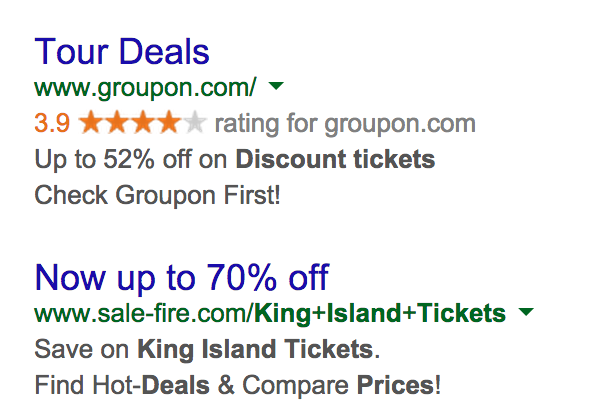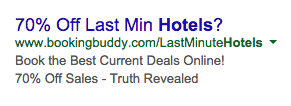Series week continues as we assess PPC management across different industries. Yesterday, Kevin covered the Healthcare industry. Today, Kristina is discussing the Tourism and Travel industry.
When I think of the many industries that see success in paid search, vacation and traveling is one my favorites. First, everyone loves vacation. The audience already exists and is aware of the different facets of the industry. The tourism industry encompasses travel, hospitality, and attractions. Only in this industry could airplane tickets, hotels, water parks, show tickets, museums and timeshares all be considered the same. When you have so many diverse businesses, it can be hard to see any universal tips or strategies to tie together the industry. However, there are several approaches that are applicable to anyone who falls under the tourism umbrella.
Know Your Traveler
Have you ever read Google’s annual research study on the typical traveler? If you haven’t, you should go and get caught up. Google has compiled an overview of what factors influence the traveler’s decision, where they are searching, and how they are booking. In 2012, they identified 3 types of travelers:
- Leisure Traveler
- Business Traveler
- Affluent Traveler
Knowing whom we are targeting is one of the easiest links to success in paid search in the tourism industry. Each type is going to have different things that appeal to them.
I like to break it down even further. Creating a persona for ads and keywords will truly allow us to target the right type of clientele. As I said earlier, everyone loves vacation, but not everyone is going to be the most relevant visitor.
For the leisure traveler, I like to look at age and kids. If my average clientele is over 60, I’m not going to create ad copy that promotes “kid friendly” benefits. Knowing how to appeal to the right type of traveler will help improve the quality of website visitors.
When focusing on the affluent traveler, money is not the largest appeal. Show ticket discounts and free offers will not have the same appeal as to the leisure traveler. By remembering, who you advertising for, we can tailor the traffic that comes to the site by what attracts them originally from our ads.
Understanding, who you are advertising for, will help tailor ad copy and landing pages to that type of visitor and the benefits that engaged them initially.
Know Your Competitors
If you have knowledge of competitor’s offers, you can only further set yourself apart from everyone else. Free quotes, discounts and savings are great, but easy to find. If I am advertising ticket deals that are “52% off” and a competitor is advertising the same tickets for “70% off”, whose ad is going to get the most attention? We don’t need to change our offer to “71% off”, but we can adjust our ads to be more competitive. Other features or benefits might have equal appeal, which is the argument for always A/B testing ads.
The easiest way to do competitor research is to use the ‘Ad Preview’ tool to determine who is showing up and directly competing for attention for that click. While Spyfu and SEMrush give insight into size of budgets ad keywords, ad copy is the most actionable item when comparing yourself with the competition.
Phone Calls Are Key
People call to book, to ask questions, and to learn more before purchasing online. Some people prefer to talk to someone on the phone when making large purchases. This is why call tracking is essential. Optimizing bid changes by phone call conversions is vital to success. Even more importantly, optimizing keywords to actual bookings can change everything. When not using call tracking, we risk choking a keyword that has been driving phone call leads or bookings.
Google’s website call conversions can be a free start to judge the volume of call traffic. Ultimately, I would recommend setting up a third party call tracking system, like Ifbyphone. This allows you track the details of the calls in all advertising platforms and can connect the call to the booking.
Location In Your Ads Is Necessary
If I am searching for a hotel in [specific city], I’m not going to click on an ad and book on a page that mentions nothing about the city that I’m trying to visit.
This ties nicely with knowing your competition! Most likely, they are using Sacramento in their ad copy, if the user is searching for “Sacramento hotels”. While it is true that your ad stands out from the rest, it is not for the right reasons. Relevancy eliminates the doubt that you won’t be able to deliver what I’m looking for.
Conclusion
The tourism industry can be competitive. One of the most important things, besides knowing your industry, is knowing how much you can pay to continue to be profitable. Cost-per-conversion and cost-per-booking goals help define success and create educated optimizations and changes. Tailoring ads and tracking phone calls are just some of the ways that help us hit these goals.






